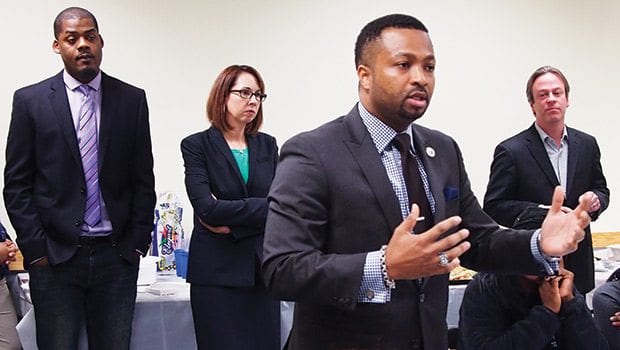
When Peter MacKinnon, president of the SEIU 509 Department of Children and Families chapter, checks in with a roomful of fellow social workers, the response isn’t always encouraging.
“The best predictor of the client’s outcomes is how they relate with a caseworker,” he said last week to a crowd of several dozen social workers crammed into a conference room at the DCF office on Park Street in Dorchester. “The best way to get to know them is to sit down at their kitchen table and find out what’s really going on. Has any member had time to do that in the last year?”
Not a single social worker responded in the affirmative.
“It’s drive-by social work,” he said.
MacKinnon’s conversation was part of the union’s appeal to legislators for a funding increase DCF social workers say the agency needs to help reduce their burgeoning caseloads. While national standards for social workers recommend that they maintain no more than 15 cases a month, those assigned to the Dorchester office say they average 25 cases. When workers have more than 20 cases, their caseload is considered crisis-level, according to standards established by the Children’s League of Massachusetts.
Unmanageable case loads
Because each family counts as one case, but families often have more than one child, some workers say they are responsible for the welfare of more than 80 children.
And when the children they look after are placed in foster homes, it’s oftentimes not in Boston.
Even though she works out of the Dorchester office, social worker Nia Rollins has to visit children in New Bedford, Fall River, Salem and Lawrence.
“I’ve got placement visits, I’ve got supervised visits,” she said. “I’ve got 40 children, I’ve got court reports and paperwork.”
The social workers complained of long work days that require them to leave home before 8 a.m. and return as late as 9 p.m.
DCF under fire
DCF was thrust into the media spotlight in 2013, after five-year-old Jeremiah Oliver went missing for months until authorities discovered the disappearance. Oliver’s mother told a social worker assigned to the family that the boy had been sent to Florida to live with grandparents, but the social worker, who subsequently was fired, never verified that assertion and was found to have skipped eight monthly visits to the Oliver family.
Oliver’s body was discovered in April, 2014. DCF Commissioner Olga Roche resigned later that month.
In response to Roche’s resignation, the Children’s League of Massachusetts issued a statement calling on state leaders to restore what they said was $131 million in funding cut from the DCF budget over the preceding seven years, which forced social workers to take on unmanageable caseloads.
The state’s fiscal year 2015 budget increased funding for DCF by nearly $50 million, allowing the agency to hire more social workers. Meanwhile Gov. Charlie Baker has proposed an additional increase in $15 million for DCF in his the fiscal year 2016 budget.
In an interview with reporters last week, Baker expressed confidence the additional funding and new hires would help the agency better manage its caseload. But newly-appointed DCF Commissioner Linda Spears said in a Globe interview last week that the agency does not have enough funding to hire an adequate number of social workers.
When questioned about Spears’ assertion, Baker said he had confidence in her ability to do the job.
“I think Linda is the right person for the job,” he said. “I’m looking forward to working with Linda and her team.”
DCF hired 644 new social workers over the last year, but DCF workers and SEIU officials say that retirements and resignations have offset the new hires, resulting in a net gain of only 292 new social workers. An increase in cases also means the number of social workers carrying crisis-level caseloads has nearly doubled since 2013, rising from 385 to 736 — that’s one in three of the 2,090 case-carrying staff at DCF.
A call for more funding
Social worker Rob Bullock, a Mattapan native who works out of the Park Street office, said the high caseloads the social workers are carrying and long hours are putting a strain on many social workers’ personal lives and have led many to quit.
“We at the Dimock Street office lost three people last week,” commented supervisor Maureen Kelly. “Nobody wants to be in a job where they’re being judged on something they can’t get done.”
During last week’s meeting, Bullock and the other social workers made appeals to state representatives Evandro Carvalho, who represent Dorchester’s 15th Suffolk District, and Jay Livingstone, who represents the 8th Suffolk District, which includes Beacon Hill and the Back Bay. Legislative aides to state Sen. Sonia Chang-Diaz and representatives Gloria Fox and Dan Hunt also were present.
“Your profession is an anchor in the community,” said Carvalho, who worked closely with social workers while he worked as a prosecutor in the Suffolk County District Attorney’s office.
Livingstone, who worked as a prosecutor in Middlesex County, said he, too, appreciated the social workers.
“I saw first-hand the work you do to support families who desperately need help,” he said.
SEIU Local 509 officials are asking legislators to commit an additional $21 million to hire additional front-line social workers and investigators, arguing that the $15 million Baker is proposing would do little more than prevent layoffs.
“Most of the times, because they want to make sure kids are safe, the social workers are working late for free,” he said. “It contributes to people leaving the agency. They reach a breaking point. We want relief. We want to see light at the end of the tunnel.
“I’m a kid from the neighborhood. I’m proud of what I do. It’s not just a job. We want to see positive changes in children’s lives. We want to stick it through. But we need help.”







